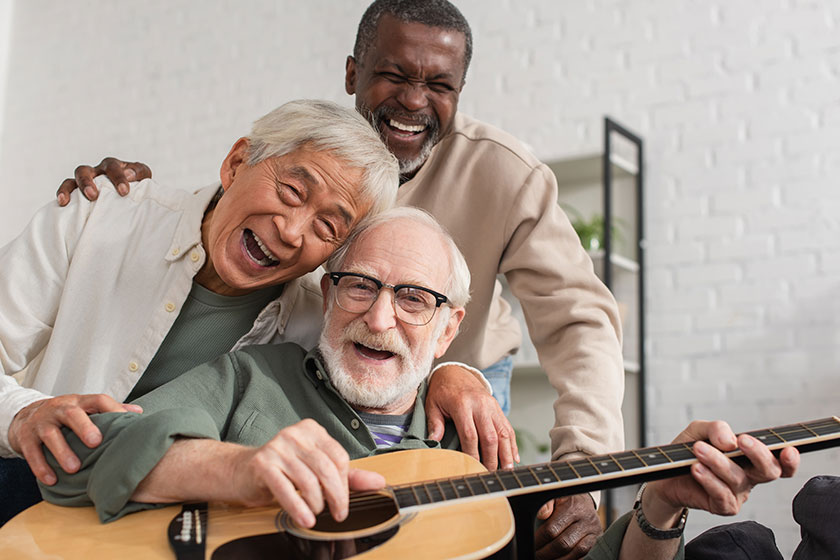Music has a remarkable power to uplift spirits, improve cognitive function and create social connections. For individuals in retirement, integrating music into daily routines can bring joy and numerous health benefits. Here are 8 engaging music activities for seniors that you can suggest to help you or your loved one experience the therapeutic and social advantages of music.
Sing-Along Sessions and Choir Groups
Singing can be a joyful activity, whether you have a musical background or not. Sing-along sessions offer a fun way to engage with familiar tunes from your youth and beyond. Many communities host regular sing-along events that feature popular songs from various eras, providing a nostalgic and social experience.
For those who enjoy a more structured approach to music, joining a choir might be the perfect fit. Choirs allow participants to learn new pieces, improve vocal techniques and prepare for performances in the community or at local events. Both activities are excellent for maintaining vocal strength and lung capacity, as well as boosting mood and cognitive function.
Instrumental Workshops
Learning to play an instrument or revisiting an instrument you once played can be incredibly rewarding. You can learn the basics of guitar, piano, ukulele or other instruments in a supportive group setting.
Taking part in instrumental workshops will provide a sense of accomplishment and improve hand-eye coordination and fine motor skills. Furthermore, the challenge of learning something new will help keep the mind sharp and engaged.
Music Appreciation Classes
For those who love to go deeper into the music itself, music appreciation classes offer a fantastic opportunity. These classes explore different genres, from classical to jazz to world music, discussing their history and influential musicians.
Participants listen to iconic tracks, learn about different musical techniques and discuss their personal interpretations and emotional responses to the music. This activity is great for stimulating cognitive abilities and fostering discussions that can lead to meaningful social interactions.
Music Therapy Sessions
Music therapy is a guided method that uses music to address physical, emotional, cognitive and social needs. A certified music therapist can work with you or a loved one to create personalized sessions that might involve playing instruments, singing, moving to music or listening to various tunes.
These sessions are designed to help manage stress, alleviate pain, express feelings, enhance memory and improve communication. Music therapy can be particularly beneficial as it provides a non-verbal outlet for expression and a therapeutic approach to managing various health issues.
Dance Parties and Movement Classes
Organized dance parties or movement classes to music provide physical activity, which is vital for maintaining mobility and flexibility. Styles can range from ballroom dancing to more casual free-form dancing.
Additionally, many communities offer classes like Zumba or dance aerobics that are tailored to older adults. These classes use rhythm and music to create an enjoyable workout environment. Dancing is a fun way to improve balance, coordination and overall physical health, while the social aspect of dancing enhances emotional well-being.
Digital Music Creation Workshops
Embrace the modern touch in music with digital music creation workshops. These sessions can introduce software and apps that simplify music composition, allowing you to create your own melodies without needing to play traditional instruments.
Digital music creation is especially engaging for those who are curious about technology and enjoy experimenting with new sounds and rhythms. It offers a unique outlet for creativity, helps improve technological skills and can be a source of great personal satisfaction when you share your creations with friends and family.
Concerts and Live Performances
Attending live music performances can be a thrilling experience. Some retirement communities organize concerts featuring local bands, orchestras or solo artists, covering a wide range of genres from classical music to rock and jazz.
Some even invite residents who were professional musicians or passionate amateurs to perform, fostering a sense of community pride and involvement. These fun events provide a sense of anticipation and excitement that can enhance your overall mood and outlook on life.
Music and Memoir Writing Workshops
Combine the emotive power of music with the reflective practice of writing in a Music and Memoir Writing Workshop. In these sessions, participants listen to pieces of music that evoke different times, places and emotions, then use those feelings as a springboard to jot down personal memories and stories.
This activity is particularly enriching as it helps you document your life stories, which can be shared with family and friends, preserving memories for future generations. Additionally, linking music to personal history can enhance emotional well-being and provide a profound sense of personal identity and continuity. These workshops offer a therapeutic and creative outlet, promoting cognitive health while nurturing the soul.
Making Music Part of Daily Life
Incorporating music into your daily life or that of your loved one in retirement can have a transformative impact on their well-being. These activities provide a mix of cognitive stimulation, physical exercise and social interaction, all essential elements for a fulfilling life. Encourage your loved one to participate in these music activities, and they may discover a new passion or rekindle an old one, leading to an enriched and joyful experience every day.







